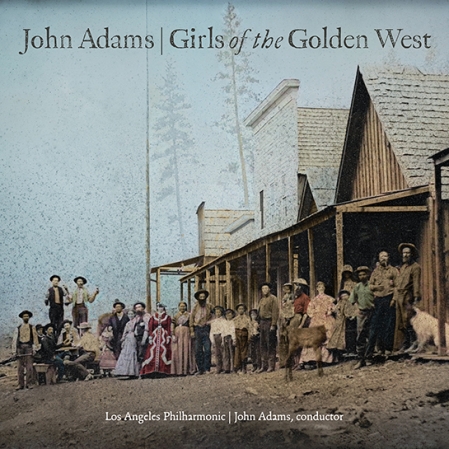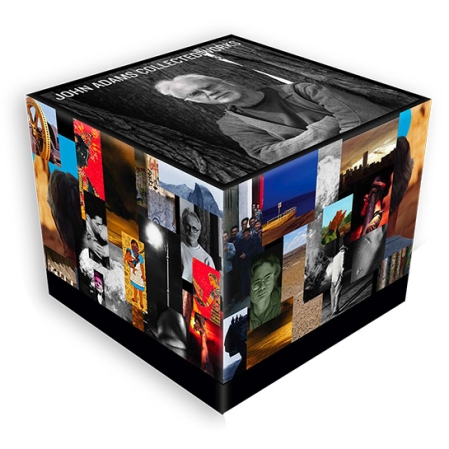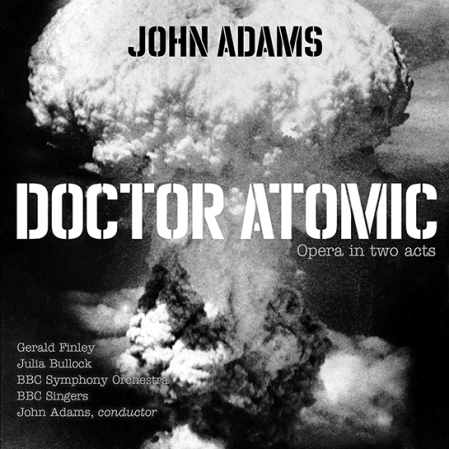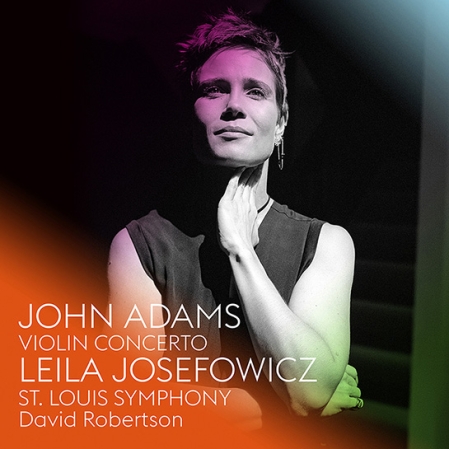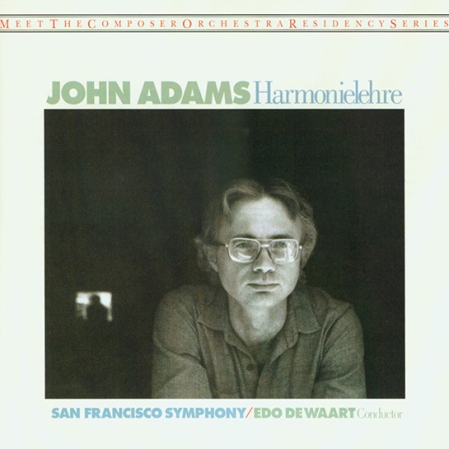This new, two-disc compilation is both companion to Adams's memoir of the same name and an exploration of his Nonesuch catalog. The composer, declares The New Yorker, "has addressed life as it is lived now, and he has found a language that makes sense to a wide audience."
John Adams's long-awaited memoir relates the composer's life story, from his childhood to his early studies in classical composition amid the musical and social ferment of the 1960s. The New York Times Sunday Book Review says: "Adams’s wry, smart memoir stands with books by Berlioz and Louis Armstrong among the most readably incisive musical autobiographies."
Available with the two-disc compilation of the same name exploring his Nonesuch catalog. The new, two-disc compilation is both companion to the memoir and an exploration of his Nonesuch catalog. The composer, declares The New Yorker, "has addressed life as it is lived now, and he has found a language that makes sense to a wide audience." The compilation is also available separately.
---
"Adams’s wry, smart memoir stands with books by Berlioz and Louis Armstrong among the most readably incisive musical autobiographies." —New York Times Sunday Book Review
"Hallelujah Junction offers the voice of America straight from the horse's mouth, and to read something so intelligent, reasoned and caring sure feels good these days." —Mark Swed, Los Angeles Times
"Adams's searingly introspective autobiography reveals the workings of a brilliant musical mind responsible for some of contemporary America's most inventive and original music." —Publishers Weekly
In Hallelujah Junction: Composing an American Life, John Adams's long-awaited memoir, the composer relates his life story, from his childhood to his early studies in classical composition amid the musical and social ferment of the 1960s, from his landmark minimalist innovations to his controversial “docu-operas." Adams offers a portrait of the rich musical scene of 1970s California, and of his contemporaries and colleagues, including John Cage, Steve Reich, and Philip Glass. He describes the process of writing, rehearsing, and performing his renowned works, as well as both the pleasures and the challenges of writing serious music in a country and time largely preoccupied with pop culture.
More than just a reflection on a single life, Hallelujah Junction tells the tumultuous story of America’s cultural life in the second half of the 20th century—and what to expect, or hope for, from the new millennium. The New York Times calls it an "absorbing book, which at times reads like a quest narrative that travels through the whole landscape of 20th-century music ... Mr. Adams writes so well that it’s a little dismaying for someone who clings to the notion that writing, like composing, is a calling developed over years, and not a hobby picked up in middle age."
For more information on the book, visit the publisher's site here.
PRODUCTION CREDITS
Disc One
Produced by Wilhelm Hellweg (1-6, 8), John McClure (7), John Adams (9)
1: Recorded March 1985 at Davies Symphony Hall, San Francisco; Engineered by John Newton
2: Recorded November 1988 at Manhattan Center Studios, New York City; Engineered by Paul Zinman; Assistant Engineer: Nelson Wong; Originally mastered by Paul Zinman at SoundByte Productions, New York City
3: Recorded March 1997 at Davies Symphony Hall, San Francisco; Engineered by John Newton; Assistant Engineer: David Bowles; Mixed and edited at Sound/Mirror, Jamaica Plain, Massachusetts
4-6: Recorded December 1987 at RCA Studio A, New York City; Balance Engineer: John Newton; Assistant Recording Engineer/Tape Editor: Henk Kooistra; Mixed January 1988 at Sound/Mirror, Jamaica Plain, Massachusetts; Production Assistant: Jennifer Keats
7: Recorded February 1993 at CTS Studios, London; Engineered by Dick Lewzey; Mixed at Skywalker Sound, Nicasio, California
8: Recorded July 1997 at Air Studios (Lyndhurst), London; Engineered by Geoff Foster; Edited and mixed by Kees de Visser at Galaxy Classics, Mol, Belgium
9: Recorded January 1992 to May 1993 in Berkeley, California; Engineered by Mark Grey; Consultant for mixing and production: Paul Dresher; Originally mastered by Robert C. Ludwig at Gateway Mastering Studios, Portland, Maine
Disc Two
Produced by John McClure (1, 2), Tommy Krasker (2), Martin Sauer (4, 5, 8, 9), Wilhelm Hellweg (6, 7)
1, 2: Recorded April and July 1991 at Auditorium Maurice Ravel, Lyon, France; Balance engineer: John Newton; Recording engineer: Henk Jensen; Recording and editing engineer: Everett Porter; Stage sound design: Jonathan Deans; Stage production sound engineer: Graham Carmichael; Audio assistant: Susan Presson; Production coordinator: Kathryn King; Kent Nagano appears courtesy of Virgin Records
3: Recorded December 1996 at Arabian Studiot, Helsinki; Engineered by Antti Murto; Additional recording May 1997 at Avatar Studios, New York City; Engineered and mixed by Tom Lazarus; Assistant engineer: Rory Romano; Edited by Paul Zinman, SoundByte Productions, New York City; Mixed at Skywalker Sound, Nicasio, California, and Sound on Sound Recording, New York City; Mastered by Ric Wilson at Digisonics, Northridge, California
4: Recorded June 1994 at Abbey Road Studios, London; Engineered by Ulrich Ruscher; Mixed by Martin Sauer and John Adams at Radio France, Paris; Originally mastered by Paul Zinman at SoundByte Productions Inc., New York City
5: Recorded October 26-26, 1999 at the Dorothy Chandler Pavilion, Los Angeles; Engineered by Richard King; Assistant Engineers: Mark Betts and Todd Whitelock; Edited, mixed, and mastered at Sony Music Studios, New York City; Edited by Todd Whitelock; Mixed by Martin Sauer and Richard King
6, 7: Recorded December 2000 at Le Théâtre du Châtelet, Paris; Engineered by Gilles Pezerat, Radio France; Assistant Engineers: Alain Joubert, Gerard Cognet, and Pierre Bouillin; Additional recording January 2001 at The Plant Recording Studios, Sausalito, California; Engineered by Mark Grey; Assistant Engineer: Billy Konkel; Edited by Pierre Bouillin at Radio France; Mixed by Gilles Pezerat at Radio France; Assistant Engineer: Pierre Bouillin; Technical director for Radio France: Francis Robert; Assembled by Jean Marie Glijssen, Polyhymnia International, Baarn, Netherlands; Mastered by Robert C. Ludwig at Gateway Mastering Studios, Portland, Maine
8: Edited by Martin Sauer; Sound engineer and mixing: Tobias Lehmann; Assistant engineer recording: Ansgar Wempe; Assistant engineer editing and mixing, mastering engineer: René Möller; Recording facilities: Teldex Studio Berlin; Recorded at the Barbican Centre, London, August 7-12, 2007; Original sound design by Mark Grey;
9: Recorded August 23, 2004 at Abbey Road Studios, London, and April 8, 2006, at Skywalker Ranch, San Francisco; Engineers: Tobias Lehmann (London) and Mark Willsher (San Francisco); Edited and mixed by Rene Moller at Teldex Studio, Berlin, and Marie Ebbing and Mark Willsher at Skywalker Ranch; Mastered by Robert C. Ludwig at Gateway Mastering Studios, Portland, Maine
John Adams’s music published by Boosey & Hawkes
Cover photo by Margaretta Mitchell
Design by Brian Chojnowski
Executive Producer: Robert Hurwitz
512396
MUSICIANS
Disc One
1: San Francisco Symphony, Edo de Waart, conductor
2: Orchestra of St. Luke’s, John Adams, conductor
3: San Francisco Symphony, John Adams, conductor; San Francisco Symphony Chorus, Vance George, director
4-6: Sanford Sylvan (Chou En-lai), James Maddalena (Richard Nixon), Thomas Hammons (Henry Kissinger), Carolann Page (Pat Nixon), Chorus; Orchestra of St. Luke’s, Edo de Waart, conductor
7: London Sinfonietta, John Adams, conductor
8: Michael Collins, clarinet; London Sinfonietta, John Adams, conductor
9: Performed by John Adams
Disc Two
1, 2: Orchestra of the Opéra de Lyon, Kent Nagano, conductor; The London Opera Chorus, Richard Cooke, director
3: Audra McDonald (Consuelo), Michael McElroy (Dewain); Seppo Kantonen, Marja Mutru, Markku Tabell, keyboards; Janne Murto, saxophone; Kari Tenkanen, clarinet, bass clarinet; Hannu Rantanen, electric bass, double bass; Jari Nieminen, guitar; Jari-Pekka Karvonen, drums; John Adams, conductor
4: Gidon Kremer, violin; London Symphony Orchestra, Kent Nagano, conductor
5: Los Angeles Philharmonic, Esa-Pekka Salonen, conductor
6, 7: Dawn Upshaw, soprano; Theatre of Voices, Paul Hillier, artistic director; London Voices, Terry Edwards, choir director; Deutsches Symphonie-Orchester Berlin, Kent Nagano, conductor
8: Jessica Rivera, soprano; London Symphony Orchestra; Schola Cantorum de Venezuela; John Adams, conductor
9: Tracy Silverman, electric violin; BBC Symphony Orchestra, John Adams, conductor





